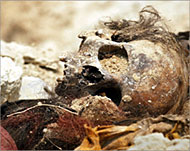Saddam trial hears of gas attacks
The trial of Saddam Hussein for genocide has resumed in Baghdad, with a witness narrating the horrors of gas attacks against Kurds in northern Iraq in the late 1980s.

Katherine Elias Mikhail, once a Kurdish peshmerga guerrilla, described on Monday how she was present when first her unit, and then a year later, her village, were gassed by Saddam’s air force.
“I saw hundreds of people – not dozens, but hundreds – and they were vomiting and teary-eyed,” she said, describing a 1987 attack on a peshmerga base.
“People with me collapsed because they had lost their sight.”
Saddam and six co-defendants were back in the dock after a three-week recess in their trial over the brutal 1987-88 Anfal campaign against Kurds in northern Iraq, which prosecutors say left 182,000 people dead.
The trial has now been adjourned until Tuesday.
The ousted Iraqi leader appeared in his trademark dark business suit along with all six of his co-defendants on Monday, including Ali Hassan al-Majid, known as “Chemical Ali” for his alleged role in the Anfal campaign gas attacks.
He accused the Kurdish witnesses appearing at the trial of trying to create “strife and division” between the people of Iraq and insisted that the Kurds had been treated fairly.
Saddam is charged with genocide, war crimes and crimes against humanity.
The six others also stand accused of a list of charges over the massacres of Iraq’s minority Kurds.
Grave charges
The genocide trial began on August 21, and the first three days saw Kurdish villagers testify that their villages had been gassed, their fields destroyed and their families exterminated in brutal death camps run by Saddam’s forces.
 |
|
Thousands of Kurds reportedly |
The trial is expected to hold sessions on three days this week, with at least six more witnesses testifying against the accused.
“I am complaining against Saddam Hussein, Ali Hassan al- Majeed, known as “Chemical Ali”, and all the international organisations or companies which provided the Iraqi regime with these weapons,” said Mikhail, from Iraq’s Christian minority, who described herself as a writer now living in Virginia.
“I demand compensation,” she said.
In a previous trial, in which Saddam was charged with the mass murder of 148 Shia in the village of Dujail, witnesses were concealed behind screens, fearing reprisals from Sunni insurgents loyal to the former leader.
While the Dujail trial proved to be a noisy show of political theatre – with Saddam and his fellow defendants blustering angrily in the dock and staging walk-outs and hunger strikes – the Anfal case has seen the accused looking more subdued.
‘No al-Qaeda link’
Saddam’s presence in the court is likely to provoke debate in America over whether toppling him was the right move in March 2003 – more than 2,600 US troops have since been killed.
A US Senate report confirmed on Friday that there was never any reliable intelligence data to link Saddam with the al-Qaeda network, as the US administration had repeatedly charged.
“Saddam Hussein was distrustful of al-Qaeda and viewed Islamic extremists as a threat to his regime, refusing all requests from al-Qaeda to provide material or operational support,” said the report.
The Senate intelligence select committee also dismissed US administration claims that Saddam had links with Abu Musab al-Zarqawi, al-Qaeda’s chief operative in Iraq, who was killed in a US air strike on June 7.